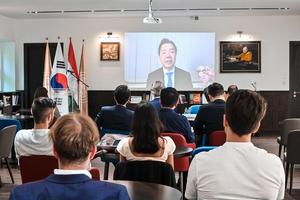The Directorate General for International Affairs (DGIA) at the Ludovika University of Public Service (LUPS) hosted a roundtable discussion on May 28 at the university's John Lukacs Lounge, focusing on energy cooperation between Hungary and South Korea and the potential opportunities within these partnerships.
The speakers examined whether there are possibilities for future energy cooperation and deepening existing collaborations between South Korea, an "energy great power," and Hungary, a Central European country with a continuously developing economy and a keen interest in connectivity, in the context of today's geopolitical and environmental challenges. The discussion was moderated by Liliana Śmiech, LUPS’ Director General for International Affairs.
“Collaboration is key to developing new nuclear energy solutions,” emphasized Kyudok Hong, Ambassador of the Republic of Korea to Hungary, at the event. He addressed the major global risks threatening the world in 2024, particularly extreme weather events. He highlighted the importance of diplomatic efforts and the need for all countries to act to mitigate these risks.
Focusing on the energy issue, he noted that the potential of small modular reactors and microreactors remains untapped. He suggested finding ways for international companies to contribute to marketing these technologies. The ambassador outlined the value of creating a consortium between Korean and other companies for cooperation in small reactor technologies. He proposed considering how South Korea could offer opportunities for transferring the designs and capabilities of small reactors to Hungary. He also stressed the importance of establishing exchange programs and joint training workshops between the two countries, focusing on areas like battery technology and electric vehicles. Additionally, he advocated for joint research projects between universities and research institutions in both countries on renewable energy technologies, including battery storage. He also underscored the importance of ongoing energy policy dialogues between experts from the two nations.
Calum T. M. Nicholson, Director of the Climate Policy Institute at Mathias Corvinus Collegium (MCC), focused on the strategic significance of energy cooperation between Hungary and South Korea in terms of energy security. “Nothing is apolitical, and there is no issue more political than energy,” he stated, emphasizing the need for genuine debates from all sides and various perspectives. He highlighted the significant increase in Hungary’s reliance on renewable energy in recent years. However, he pointed out that dependence on Russian energy reflects broader geopolitical concerns related to sovereignty.
He also discussed Hungary’s historical context, noting that the country traditionally had a labor-intensive economy primarily focused on agriculture and industrialized relatively late. He added that Hungary is a relatively small country in Europe, situated in an unstable geopolitical environment influenced by neighboring countries, a situation somewhat similar to South Korea’s.
András Kocsis, Head of Department at the Ministry of Energy, spoke about Hungary’s energy sovereignty, which he deemed extremely important, asserting that every nation has the right to adequately represent this stance. He also emphasized the importance of diversifying energy sources.
He touched on the concept of energy poverty, which he explained not only means that many households cannot afford utility costs necessary for a decent quality of life but also that, as a result, they produce heat by burning environmentally harmful materials, which should not be used due to their significant pollution.
Speaking about nuclear energy, he noted that the European Commission also recognizes its importance, despite there being an anti-nuclear faction within the European Union. He stated that this type of energy is reliable and affordable, but it is crucial to adhere to various related guidelines. He also mentioned that the Hungarian government is extremely proud of its connection with Samsung, a company representing cutting-edge technology.
Text: Éva Harangozó
Photo: Dénes Szilágyi
.jpg)
.jpg)


.jpg)
.jpg)